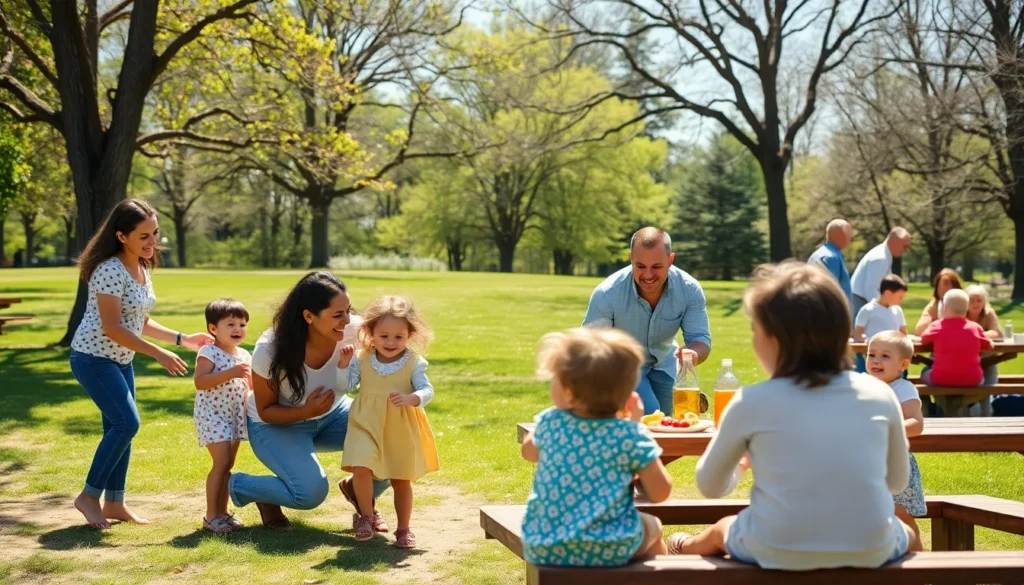Table of Contents
ToggleRespiratory Syncytial Virus, or RSV, might sound like a character from a sci-fi movie, but it’s very real and can wreak havoc, especially for young children and the elderly. This sneaky virus loves to spread during the colder months, turning cozy family gatherings into sneeze-fests. But don’t worry; prevention is the name of the game, and vaccines are the superheroes we didn’t know we needed.
Imagine a world where RSV fears are a thing of the past—where parents can breathe easy and grandparents can enjoy their grandkids without the worry of catching a nasty virus. With the latest advancements in RSV vaccines, that world is closer than ever. Join the fight against RSV and discover how these vaccines can be your best defense against this pesky invader.
Overview of RSV
Respiratory Syncytial Virus, or RSV, primarily affects the respiratory tract. Young children and the elderly experience severe symptoms, especially during the fall and winter months. With RSV being the leading cause of bronchiolitis in infants, understanding its transmission is crucial. The virus spreads through respiratory droplets when an infected person coughs or sneezes. Close contact with contaminated surfaces also plays a significant role in transmission.
Symptoms often include a runny nose, cough, and fever. In some cases, RSV can lead to more serious conditions like pneumonia. Medical professionals recognize that RSV can be particularly dangerous for premature infants and those with underlying health conditions. Hospitalization rates for high-risk groups significantly increase, emphasizing the need for preventive measures.
Vaccines developed to combat RSV aim to protect at-risk populations. These vaccines undergo rigorous testing to ensure safety and efficacy. In 2023, several promising RSV vaccines received approval, marking a major milestone in prevention efforts. Vaccination can significantly reduce the incidence of severe RSV-related illness.
Monitoring RSV seasonality helps healthcare providers anticipate outbreaks. Communities benefit from education on recognizing symptoms and implementing hygiene practices. By fostering awareness, families can better protect their loved ones from the virus. Enhanced public health initiatives contribute to lower transmission rates each year, creating a healthier environment.
Innovative research continues to advance understanding of RSV. New treatments are also in development, aiming to complement vaccination efforts. This proactive approach ensures that the medical community responds effectively to RSV challenges. Collaboration among health organizations and researchers remains essential in the ongoing fight against RSV.
Importance of RSV Prevention
Focusing on RSV prevention significantly impacts public health. The virus leads to substantial healthcare costs, particularly during peak seasons. Annually, RSV causes 177,000 hospitalizations in children under five years old in the United States alone. Lower respiratory tract infections from RSV create a considerable burden on healthcare systems, making prevention efforts essential.
Monitoring RSV seasonality helps guide public health initiatives. Educational campaigns increase awareness regarding symptoms and proper hygiene measures. These actions decrease transmission rates and foster community cooperation. Sustainable prevention strategies pave the way for healthier environments, especially during high transmission seasons.
Impact on Public Health
RSV poses a major public health challenge affecting all age groups. Seasonal outbreaks often strain healthcare resources and increase emergency room visits. Approximately 14,000 deaths occur each year in adults aged 65 and older due to RSV complications. The cumulative effect of RSV on hospitalizations and healthcare expenditure emphasizes the need for effective prevention and vaccines.
Implementing widespread vaccination programs could lower these statistics. Vaccines not only protect individuals but also contribute to herd immunity. Public health campaigns that educate communities on prevention thrive on collective responsibility. Enhanced disease monitoring and rapid vaccine distribution strengthen local health systems against RSV threats.
High-Risk Populations
Certain populations face a higher risk of severe RSV infection. Premature infants represent the most vulnerable group, with their underdeveloped lungs and immune systems. Young children with congenital heart disease or chronic lung conditions also experience increased susceptibility. Older adults, particularly those with pre-existing health issues such as asthma, experience heightened risks too.
Targeted prevention strategies are crucial for these high-risk groups. Vaccination programs tailored for vulnerable populations help reduce severe illness. Parents should engage in preventative practices, such as promoting good hygiene and minimizing exposure during peak seasons. Health organizations emphasize the importance of education to empower parents and caregivers in safeguarding their children’s health.
Current Vaccines for RSV
Multiple vaccines have emerged in 2023, targeting the prevention of Respiratory Syncytial Virus (RSV) among vulnerable populations. These vaccines are integral to reducing the spread and severity of RSV infections, fostering community health.
Types of RSV Vaccines
Current RSV vaccines include both maternal and pediatric options, designed specifically for high-risk groups. A key example is the maternal vaccine that provides protective antibodies to infants before birth. Pediatric vaccines target young children, particularly those born prematurely or with underlying health conditions. Monoclonal antibodies, administered to at-risk infants, represent another treatment avenue, offering immediate protection against severe RSV disease.
Efficacy of Available Vaccines
Efficacy rates for RSV vaccines vary, with recent data suggesting a significant reduction in hospitalization rates for vaccinated populations. Clinical trials reported efficacy levels exceeding 80 percent, particularly among premature infants and young children with health concerns. Continuous monitoring indicates that vaccinated individuals experience milder symptoms and lower transmission rates. These promising results underscore the importance of vaccination as a frontline defense against RSV-induced complications.
Strategies for RSV Prevention
Effective strategies for RSV prevention focus on multiple facets, including hygiene practices and vaccination efforts. Implementing these methods can significantly reduce the risk of RSV transmission.
Non-Pharmaceutical Interventions
Hygiene plays a crucial role in preventing the spread of RSV. Families should practice frequent handwashing with soap and water, especially after coughing or sneezing. Cleaning and disinfecting surfaces, such as toys and doorknobs, helps eliminate the virus. Parents can limit contact with individuals showing cold-like symptoms, significantly lowering exposure risk. Keeping infants away from crowded places during RSV season also reduces transmission chances.
Education on recognizing RSV symptoms empowers caregivers to seek timely medical care. Measures like avoiding smoke exposure can improve respiratory health and decrease RSV complications.
Role of Vaccination Programs
Vaccination programs serve as a cornerstone in the fight against RSV. New vaccines, both maternal and pediatric, protect vulnerable populations effectively. Maternal vaccines provide infants with antibodies before birth, while pediatric options target young children, particularly those at risk. Significant clinical trial efficacy rates of over 80 percent demonstrate their effectiveness in reducing hospitalizations.
Implementing widespread vaccination efforts limits the overall incidence of severe RSV cases. Public health organizations prioritize these programs, aiming to increase awareness and accessibility. Community involvement in these initiatives fosters herd immunity, ultimately protecting those most at risk.
Future Directions in RSV Research
Ongoing advancements in RSV research focus on enhancing vaccine efficacy and expanding preventive measures. Researchers are actively working on innovative formulations that target various RSV strains and boost immune responses. This effort includes the exploration of mRNA technology as a promising method. New vaccine candidates show greater potential for long-lasting immunity, which can ultimately reduce hospitalization rates further.
Advancements in Vaccine Development
Efforts in vaccine development have made significant strides. Results from recent studies indicate mRNA vaccines exhibit strong immune responses in infants and young children. Additionally, maternal vaccines are designed to transfer protective antibodies to newborns effectively. Preliminary data suggests these innovations could lower RSV-related hospitalizations by over 80 percent in high-risk populations. Expanding the availability of these vaccines will play a crucial role in public health initiatives.
Ongoing Clinical Trials
Ongoing clinical trials are essential for refining RSV prevention strategies. Researchers are evaluating both new vaccine candidates and monoclonal antibody treatments in various demographics. Some trials specifically target premature infants and the elderly, examining safety and efficacy. Data collected from these trials will guide future vaccine formulations. Results are expected to enhance understanding of RSV immunity and inform vaccination protocols across healthcare settings.
Conclusion
RSV poses a significant threat to vulnerable populations, but advancements in prevention and vaccination are paving the way for a healthier future. With the introduction of effective vaccines and ongoing research, families can look forward to gatherings free from the fear of respiratory illnesses.
Emphasizing hygiene practices and timely education about symptoms further strengthens community defenses against RSV. As vaccination efforts expand and new treatments emerge, the collective goal remains the same: to protect those at risk and reduce the impact of RSV on public health. The commitment to combating this virus is crucial in fostering a safer environment for everyone.








